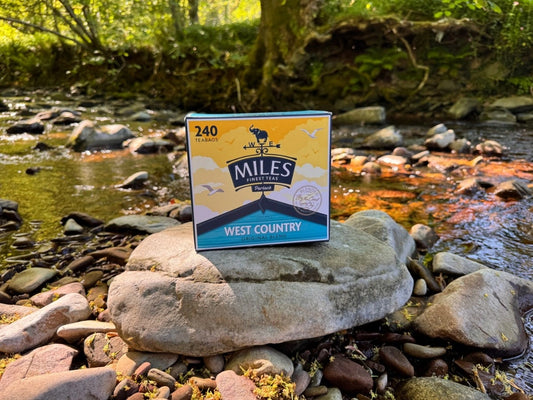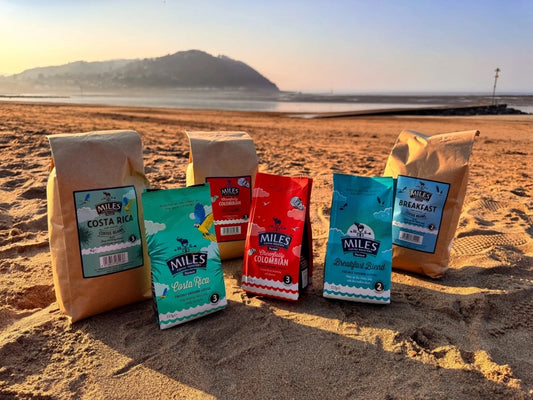Darjeeling Loose Tea
The blend
Grown in the Darjeeling region of North East India, in the foothills of the Himalayan Mountains, this tea is one of the finest available. Darjeeling tea will produce a bright amber colour once brewed.
The taste
Often described as the ‘Champagne of teas’, Darjeeling is lighter than most black teas, with a distinctive fruity, muscatel character.
The benefit
Black tea contains polyphenols, a type of antioxidant. Caffeine and an amino acid called L-theanine are also found in black tea, which is said can improve alertness and focus – even more than coffee!
The moment
Enjoy this tea when you want to impress guests or add a bit of glamour into your afternoon! This tea is the most exquisite of blends.
The creation
Using traditional methods of blending and tasting, this tea has been carefully crafted by the Miles team, using Miles experTeas!
Based on the edge of Exmoor and on Somerset’s coastline, we take inspiration from our beautiful surroundings to create a cuppa that embodies a little escape, evoking memories of a holiday in the West Country, with each sip. Our attention to detail and experience ensures a consistent, flavourful tea that will see you constantly topping up your mug.
We are founding members of the Ethical Tea Partnership (ETP). The ETP is a not-for-profit organisation, which convenes tea companies, developing agencies, governmental and non-governmental organisations to improve the lives of communities within the tea sector. Each purchase directly helps to provide better living and working conditions for those working in the tea trade.
Free delivery on UK orders over £40 | Click for more details
How do you brew Darjeeling loose leaf tea?
When brewing Darjeeling loose leaf tea, it is important to follow a few key steps to ensure a perfect cup. Begin by heating water to around 90-96°C, as boiling water can scald the delicate leaves and affect the flavor. Place 1 teaspoon of Darjeeling loose leaf tea per cup into a teapot or infuser. Pour the hot water over the leaves and let them steep for about 3-5 minutes, depending on your preference for strength. Once steeped, strain the tea leaves out and pour the brewed tea into your cup. Darjeeling tea is known for its floral and muscatel notes, so take the time to savour its unique flavor profile. Enjoy your freshly brewed Darjeeling loose leaf tea either plain or with a splash of milk or a slice of lemon, according to your taste preferences.
Is Darjeeling tea healthy?
Darjeeling tea is considered a healthy beverage due to its high concentration of antioxidants and beneficial compounds. It is rich in polyphenols, which have been linked to various health benefits, including improved heart health, reduced inflammation, and enhanced immune function. Darjeeling tea also contains catechins, which are known for their antioxidant properties that help protect cells from damage and reduce the risk of chronic diseases. Additionally, this tea is low in calories and can be a great alternative to sugary beverages. Consuming Darjeeling tea as part of a balanced diet may contribute to overall health and well-being.
What is the difference between Darjeeling tea and regular tea?
Darjeeling tea is a type of black tea that is grown specifically in the Darjeeling district of West Bengal, India. It is known for its unique flavor profile, which is often described as muscatel or fruity, with floral undertones. The tea plants grow at high altitudes in the region's cool climate, which contributes to the distinctive taste of Darjeeling tea. On the other hand, regular tea refers to a broader category of teas that are not specific to any region or variety. This can include black, green, white, or herbal teas from various regions around the world. Regular black tea, for example, is typically stronger and bolder in flavor compared to the delicate and nuanced taste of Darjeeling tea. In summary, the main differences between Darjeeling tea and regular tea lie in their origin, flavor profile, and growing conditions. Darjeeling tea stands out for its unique taste and territory-specific characteristics that set it apart from other types of tea.
















